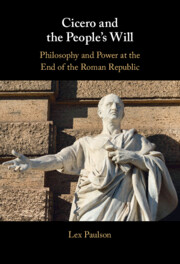Book contents
- Cicero and the People’s Will
- Cicero and the People’s Will
- Copyright page
- Dedication
- Contents
- Acknowledgments
- Abbreviations
- Introduction
- Part I The Practice of Voluntas
- Chapter 1 Forebears of Will
- Chapter 2 Innocence and Intent
- Chapter 3 Cartographies of Power
- Chapter 4 An Economy of Goodwill
- Chapter 5 Voluntas Populi
- Part II The Philosophy of Voluntas
- Appendix Occurrences of Voluntas in the Works of Cicero
- References
- Index
Chapter 1 - Forebears of Will
from Part I - The Practice of Voluntas
Published online by Cambridge University Press: 24 November 2022
- Cicero and the People’s Will
- Cicero and the People’s Will
- Copyright page
- Dedication
- Contents
- Acknowledgments
- Abbreviations
- Introduction
- Part I The Practice of Voluntas
- Chapter 1 Forebears of Will
- Chapter 2 Innocence and Intent
- Chapter 3 Cartographies of Power
- Chapter 4 An Economy of Goodwill
- Chapter 5 Voluntas Populi
- Part II The Philosophy of Voluntas
- Appendix Occurrences of Voluntas in the Works of Cicero
- References
- Index
Summary
The opening chapter examines the forebears of Cicero’s notion of will in Greek thought and Roman usage in the period before his birth, with special attention given to the playwrights Plautus and Terence. There was no “will of the people” in classical Greece. The demos wielded power not by delegation but in active, autonomous decision. There is no special discourse of representation in classical Athens, because in classical democracy (unlike today) there is no permanent governing class. In the Republic, Plato proposes that reason and appetite reside in different parts of the soul; though we succumb to appetite despite “knowing better,” in a harmonious soul as in a just city, reason must rule. Plato’s star student is the first to propose a full theory of human action, but neither Aristotle’s boulesis (the desire for ends) nor his prohairesis (the choice of means) map onto the faculty that Latin speakers would call voluntas. It is the Stoics, and particularly Epictetus, who have been credited by some as inventors of the will due to their intense focus on regulating our inner responses to events and forming the correct intention.
Keywords
- Type
- Chapter
- Information
- Cicero and the People’s WillPhilosophy and Power at the End of the Roman Republic, pp. 17 - 31Publisher: Cambridge University PressPrint publication year: 2022



